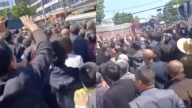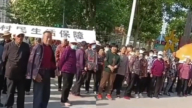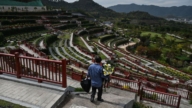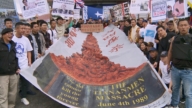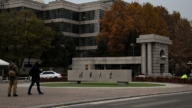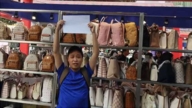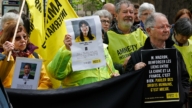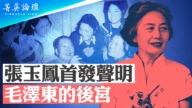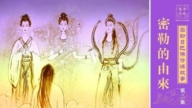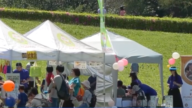【新唐人2013年10月21日讯】10月下旬,《广东省信访条例》草案即将出炉,当地人大常委会首次邀请6名基层上访群众参加立法座谈会,就上访人数设限为5人征询民意,结果遭到市民代表一致反对。
10月18号,广东省人大常委会法制委员会主任委员金正佳邀请6名基层上访群众参加立法座谈。他询问代表,信访条例如果划定统一事项上访人数上限为5人,“能不能把话说清、达到目的?”
作为广州拆迁户集体的代表,许景华给出了否定意见。他说,“没有实权的人整天说研究研究,害死人。”许景华认为,座谈现场一定要请到真正有“话事权”的人,只有这样才能说服5个代表,让他们劝服其他人不要上访。
群众代表费振宇也对限制上访人数抱有怀疑,他认为信访本身就是司法诉讼正常管道外的“非常规手段”,有时还靠领导意志拍板解决,立法限制上访人数很可能执行不了,成为一纸空文。
广东维权人士天理:“他目的很简单,不想你造成任何的群体活动,因为限制五个人的话,你五个人怎么闹,他10个警察就把你搞定了。如果你几百人过来,他就要上千个警察。”
北京知名维权人士胡佳也指出,多少人一起表达同一诉求,都不违法。
北京维权人士胡佳:“国家信访局出台的信访条例应该是2005年5月1号实行的,那里边已经是做这样的规定了。它主要的目的是限制群体性上访。”
设在四川成都的“中国人权资讯中心”负责人黄琦在去年底就表示,在中共政府一系列政策干预下,越来越多的民众财产遭到官商集团的强占。目前全国的访民人数已经达到上千万,失地农民也达到了上亿人。
事实上,全国各地访民以各种方式申诉,一直是此起彼伏。
10月1号,来自全国各地的数千访民涌向天安门表达诉求,有的喊冤,有的抛撒传单,当天据说有3、4百人被抓。
广东南海访民苏昌兰:“他所列出来种种的上访规定条例,都是忽悠老百姓的,上访根本解决不了。老百姓权益受到侵害,上访是解决不了的。”
10月15号早晨,河南洛阳1500多名退役军官身穿“冤”字黄马褂游行示威,在市政府大门前高呼“反对剥夺”、“还我身份”、“还我待遇”、“在企业退役军官冤!冤!冤!”等口号。
10月18号,最高检信访接待室前,早晨4点就挤满了上访的百姓。
访民:“欺压老百姓,打倒中国共产党!”
据报导,当天上访访民遭到警方殴打。
广东维权人士天理:“当局应该清清楚楚,他要达到所谓的社会稳定,它一定要解决上访冤民上访的人员。”
面对中国堆积如山的冤假错案,人权律师郭国汀曾撰文指出,要根除冤假错案的唯一方法,是彻底抛弃中共的专制暴政。
采访/朱智善 编辑/宋风 后制/萧宇
Draft Guangdong Regulations Limit Number of Petitioners to Five.
Guangdong province is going to publish a
draft Petition Regulations in late October.
For the first time, the local People’s Congress invited
six petitioners to participate in a legislative forum.
The proposal limiting the number of petitioners to
five met unanimous opposition from all six participants.
On October 18, the Chairman of Guangdong Provincial
People’s Congress Law Committee, Jin Zhengjia, invited
six petitioners to participate in legislative discussions.
He asked if limiting the number of petitioners to a maximum
of five for one incident would “help to convey the message?”
Xu Jinghua, Guangzhou representative
for forced demolitions, opposed the idea.
He said that it will only cause more damage when those
who have no authority talk about looking into these matters.
It is only if someone has the “final say” that will convince five
representatives to persuade others not to go through petitions.
Fei Zhenyu, a community representative, is
skeptical about limiting the number of petitioners.
He says that petition is an unconventional
means outside the usual judicial channels.
The results sometimes rely on the petition office leader.
A regulation limiting the number of
petitioners is unlikely to be followed.
Tian Lee, Guangdong activist: “The purpose
is as simple as to restrict a mass incident.
With five petitioners, 10 police will easily take care of them.
They’ll need thousands of police
to handle hundreds of petitioners.”
Hu Jia, Beijing human rights activist, does not believe
it is illegal for many people to pursue the same issue.
Hu Jia: “Petition regulations were
implemented on May 1, 2005.
The number of petitioners was already regulated
to 5, which intended restricting mass petitions.”
Huang Qi is the organiser of a human rights
website in Chengdu, Sichuan Province.
Huang indicated last year that policies have
caused more Chinese peopl to suffer loss,
from officials and businesses colluding.
There are many tens of millions of petitioners and
hundreds of millions of landless peasants nationwide.
Various complaints have taken place
one after another throughout China.
On October 1, thousands of petitioners gathered
in Tiananmen Square to express their demands,
and raise awareness of their suffering.
It was said reported around 400 of them were arrested.
Su Changlan, petitioner, Nanhai, Guangdong:
“The petition regulations are to fool the people.
A petition does not solve any problem. Infringed
rights are never resolved through petitioning.”
On the morning of October 15, 1,500 retired military officers
gathered in front the City Hall in Luoyang, Henan Province.
They were yellow vests with “Injustice” printed on them.
They shouted slogans, including “against deprivation”,
“give me back my identity”, and “give me back my salary”.
They also shouted, “retired officers
suffer injustice, injustice, injustice.”
On October 18, the highest petition office in Beijing
was packed with petitioners at 4 o’clock in the morning.
Petitioner: “Overthrow the Chinese
Communist Party. You oppress the people!”
This petitioner was reportedly subjected to police beating.
Tian Lee, Guangdong activist: “The authorities should
understand clearly that social stability requires solving
the fundamental injustices that these petitioners suffer.”
Facing many cases of injustice, human rights lawyer
Guo Guoting stated in an article that the only way to
eliminate injustice is to abandon the tyranny of the CCP.
Interview / Zhu Zhishan Edit / Song Fong Post-production


